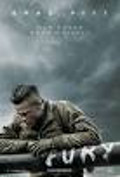
Directed by
David Ayer
134 minutes
Rated MA
Reviewed by
Bernard Hemingway

Fury (2014)
Synopsis: Germany, April, 1945. As the Allies make their final push, a battle-hardened army tank commander, Sergeant Don “Wardaddy” Collier (Brad Pitt) leads an advanced guard into enemy-held territory.
Fury is, to say the least, a strange film to get one’s head around, or maybe it's simply a film that is designed to pulverize that seat of reason. On the one hand it’s a brilliantly-staged action film with an intensely visceral series of battle sequences that well out-punch the vapid CGI and SFX-driven equivalents in Hollywood blockbusters these days. On the other, it’s an anachronistic, and not to put too fine a gloss on it, revisionist, throw-back to John Wayne-era machismo and American Way heroics that war films for the past three or four decades have steadfastly eschewed.
Appropriately the theatre of conflict is not the humiliating disaster of Vietnam or any of America’s murky interventions in the Middle East in more recent times but a back-track to the simple good vs.evil certainties of WWII. Much as he was in Tarantino’s Inglorious Basterds Pitt is on a mission to kill Nazis, only this time with a Sherman tank and a passle of genre-typical grunts as well as a fresh-faced rookie gunner, Norman (Logan Lerman). The latter more or less provides the point of view for us to witness Collier’s samurai-like philosophy in action as he paternalistically oversees Norman’s transformation from whining panty-waist to Nazi-killing chip off the old block.
Pitt, who co-executive produced (that means put his money into) the film, appears in the opening scene leaping from his tank and killing an SS officer who for no apparent reason is riding a white horse through a post-battle wasteland. Having failed to incarnate himself as an action figure in 2013’s World War Z Pitt is evidently giving the project another shot as the Waynean/G.I. Joe simulacrum, Sergeant Don Collier, complete with world-conquering swagger, and as we see in one scene, a body-builder’s physique. Collier is as tough as an old boot but with an unshakeable commitment to his men, who are, as in one of John Ford’s Westerns, rough-heads all but in turn unswervingly loyal to him. With an indefatigable hatred of the SS he metes out summary justice with Biblical vengeance, which includes forcing Norman to experience his “first blood” by executing a captured German soldier as admiring grunts look on in implied affirmation of the tenet expressed at one point by Collier that “ideals are peaceful. History is violent”.
A film such as Lebanon with very limited means brought home the actuality of being in a tank negotiating enemy territory and indeed, most war films worthy of commendation focus on the disparity between the myths and realities of war. This is not director Ayer’s agenda. As the title suggests, Fury is a full-on testosterone-fueled fantasy of righteous killing and heroic self-sacrifice played out with exhilarating ferocity and big-budget pyrotechnics. As Collier and his typology of rank-and-file cohorts intone after a session of laying waste to faceless hostiles: “This is the best job I’ve ever had”. It’s a grotesque sentiment that would be dismissed out-of-hand were the film not so effective in making it seem a plausible behavioural model. It’s easy enough to deconstruct the rhetoric, to admire the technical skill of the film whilst bracketing its jock-strap simplicitudes. The worry is that not everyone will do so.

Want more about this film?


Want something different?




